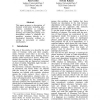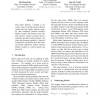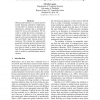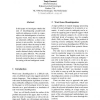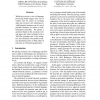ACL
2001
14 years 1 months ago
2001
This paper proposes a description of German word order including phenomena considered as complex, such as scrambling, (partial) VP fronting and verbal pied piping. Our description...
ACL
2003
14 years 1 months ago
2003
ACL
2003
14 years 1 months ago
2003
We demonstrate that an unlexicalized PCFG can parse much more accurately than previously shown, by making use of simple, linguistically motivated state splits, which break down fa...
ACL
2001
14 years 1 months ago
2001
We describe the use of XML tokenisation, tagging and mark-up tools to prepare a corpus for parsing. Our techniques are generally applicable but here on parsing Medline abstracts w...
ACL
2003
14 years 1 months ago
2003
This paper presents a method to develop a class of variable memory Markov models that have higher memory capacity than traditional (uniform memory) Markov models. The structure of...
ACL
2001
14 years 1 months ago
2001
This paper addresses recent progress in speaker-independent, large vocabulary, continuous speech recognition, which has opened up a wide range of near and mid-term applications. O...
ACL
2003
14 years 1 months ago
2003
Ordering information is a critical task for natural language generation applications. In this paper we propose an approach to information ordering that is particularly suited for ...
ACL
2001
14 years 1 months ago
2001
In this paper we investigate whether the task of disambiguating pseudowords (artificial ambiguous words) is comparable to the disambiguation of real ambiguous words. Since the two...
ACL
2001
14 years 1 months ago
2001
While the generative view of language processing builds bigger units out of smaller ones by means of rewriting steps, the axiomatic view eliminates invalid linguistic structures o...
ACL
2003
14 years 1 months ago
2003
Kernel-based learning (e.g., Support Vector Machines) has been successfully applied to many hard problems in Natural Language Processing (NLP). In NLP, although feature combinatio...
